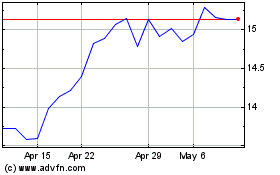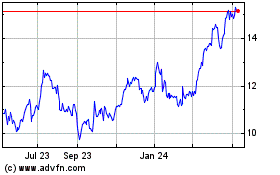By Patricia Kowsmann and Paul J. Davies
German banking giant Deutsche Bank AG will likely depend on an
obscure but valuable accounting quirk to make a deal for smaller
rival Commerzbank AG workable.
Deutsche Bank has told investors and others close to the bank
that it hopes European Central Bank supervisors will allow wide
latitude to use the accounting treatment -- known as negative
goodwill, or "badwill" -- as part of a takeover, people familiar
with the talks said.
The two banks have been in formal talks since March over a
potential merger, spurred on by the German government. There is no
guarantee a deal will happen. Both banks are viewed skeptically by
investors and trade at deep discounts to their book value,
reflecting poor profits and lingering doubts about the quality of
some assets.
A combined bank could recognize a onetime profit of more than
EUR16 billion, or more than $18 billion, using badwill, according
to analyst estimates. That profit would be crucial for maintaining
the combined entity's capital ratios, which regulators are likely
to increase as a condition of approving a deal.
The badwill number could vary greatly depending on the valuation
paid for Commerzbank. It could also shrink if Deutsche Bank, after
it executes a deal, decides Commerzbank's assets are worth less
than their current book value. The less badwill that is generated,
the more fresh capital from shareholders could be needed.
Deutsche Bank shareholders, who since 2008 have injected more
than EUR30 billion of capital into the bank, are resistant to put
in much more. Even with a hefty badwill gain, the combined bank
will need fresh cash to lay off employees and close unwanted
operations. Asset disposals -- such as selling Deutsche Bank's
asset management arm DWS, or Commerzbank's Polish operations known
as mBank -- could also be used to raise cash.
"This is not free money that can be used to fund restructuring
costs or clean up the balance sheet or return to shareholders,"
Jeremy Sigee, analyst at Exane BNP Paribas, wrote in a recent note.
"Every penny of it is needed to keep the regulatory capital ratios
where they started."
Badwill lets buyers book a profit if they buy a target for less
than net-asset value, or book value, which is the difference
between a firm's assets and liabilities. If a target company is
sold for less than its stated book value, then the buyer can treat
the difference as a gain.
It doesn't happen often because buyers normally pay more than a
company's book value. In those cases, the excess paid is recorded
as an asset called goodwill, or the value of the intangible bits
that may have inspired the deal in the first place, such as the
target firm's brand value.
In Commerzbank's case, the shares trade at about a third of book
value, so even at a hefty premium to the share price, Deutsche Bank
will pay far less than book value.
The shares that Deutsche would likely issue to Commerzbank
shareholders to pay for the deal, plus the badwill gain, would add
up to roughly the amount of equity that Deutsche Bank needs to
support the Commerzbank assets it takes onto its balance sheet,
according to analyst estimates.
The ECB is also expected to increase the enlarged bank's minimum
required capital to protect against integration and restructuring
risks, and because the lender will become more systemically
important -- it would be the second largest in the eurozone by
assets after BNP Paribas.
There are roadblocks to booking badwill profits. For one,
Deutsche Bank will have to review the valuation of Commerzbank's
assets and some may have to be marked down. That would cut into the
combined group's final gain.
Jon Peace, a Credit Suisse analyst, thinks even after large
badwill gains, Deutsche will need to raise about EUR8 billion in
fresh capital from shareholders. This money could fund about EUR5
billion of restructuring costs and an estimated EUR3 billion in
write-downs to the value of bonds owned by Commerzbank, many of
which are Italian government bonds that currently aren't marked to
market, but held at historic cost.
"If Deutsche wants to pay for some of its restructuring costs up
front, it still needs to raise capital," Mr. Peace said.
Regulators keep a close eye on badwill calculations, and it will
be up to the ECB to determine the amount of badwill to include in
the bank's capital ratios. Recent European bank acquisitions have
taken advantage of this accounting tool, but involved gains in the
hundreds of millions of euros.
Not every cheap bank takeover generates badwill. When Spain's
Bankia SA took over Banco Mare Nostrum SA in 2017, it appeared as
if the deal would bring in EUR1.2 billion of badwill. But after
Bankia revalued the books, a mixture of asset write-downs and
liability increases erased all of that.
In 2008, U.K.'s Lloyds Banking Group PLC generated GBP11.2
billion of badwill gains from its takeover of mortgage lender HBOS
PLC. But the deal turned out to be disastrous because HBOS's loan
book was much worse than thought. The badwill profits, booked in
2009, were more than wiped out by nearly GBP17 billion in
impairments on bad loans and the group was bailed out by the
government.
--Jenny Strasburg contributed to this article.
Write to Patricia Kowsmann at patricia.kowsmann@wsj.com and Paul
J. Davies at paul.davies@wsj.com
(END) Dow Jones Newswires
April 14, 2019 08:14 ET (12:14 GMT)
Copyright (c) 2019 Dow Jones & Company, Inc.
Commerzbank (PK) (USOTC:CRZBY)
Historical Stock Chart
From Sep 2024 to Oct 2024

Commerzbank (PK) (USOTC:CRZBY)
Historical Stock Chart
From Oct 2023 to Oct 2024
